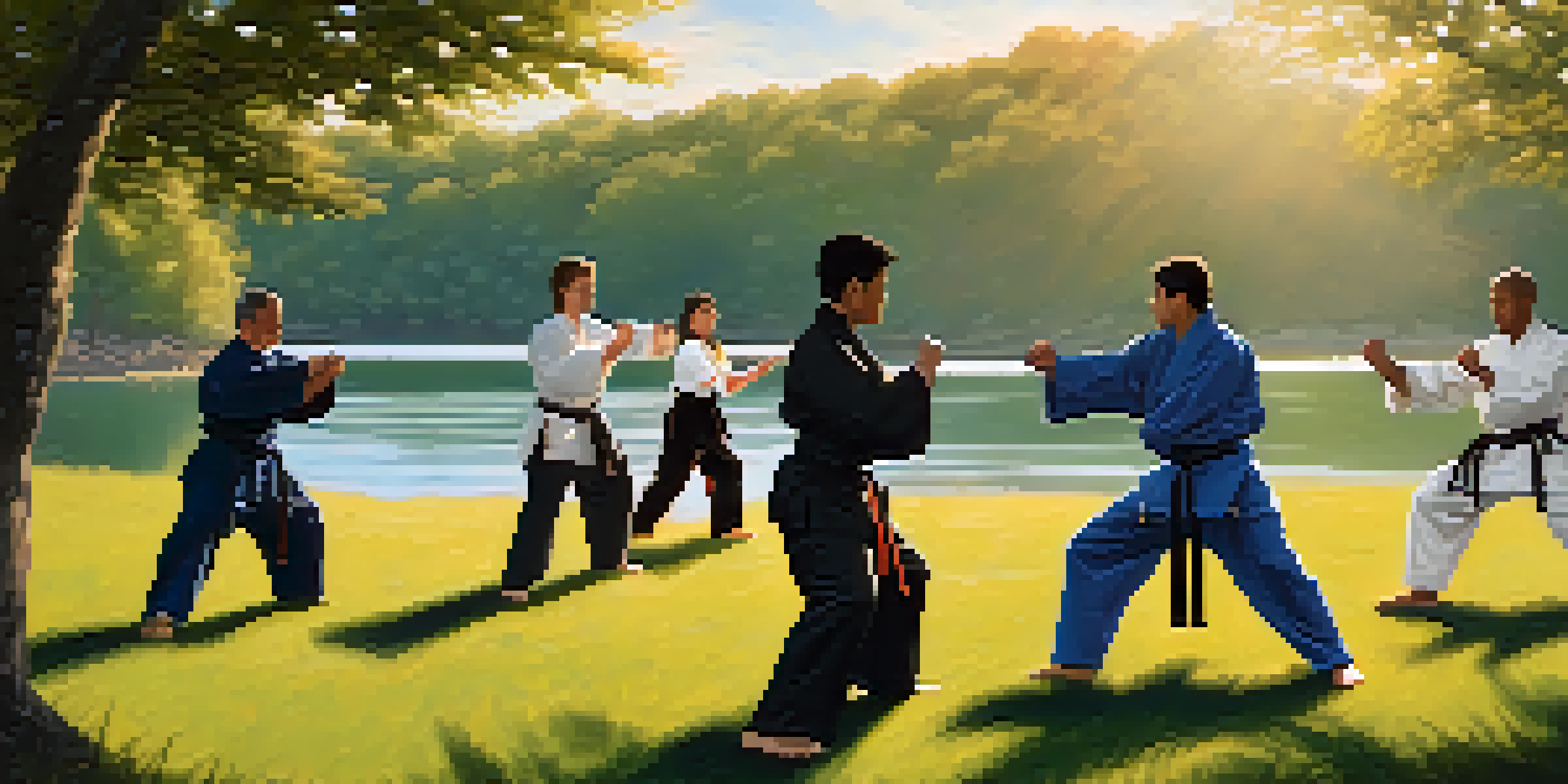The Intersection of Empathy and Self Defense Strategies

Understanding Empathy: More Than Just Sympathy
Empathy is often misunderstood as mere sympathy, but it goes much deeper. It's the ability to put yourself in someone else's shoes and understand their feelings and perspectives. This understanding can be crucial in high-pressure situations, where recognizing another person's emotions can guide your response effectively.
Empathy is about finding echoes of another person in yourself.
In self-defense contexts, empathy allows you to assess a situation from multiple angles. For example, if you can recognize the stress or fear in an aggressor, you might choose to de-escalate rather than confront. This approach not only protects you but also considers the humanity of the other person involved.
Ultimately, empathy fosters communication, which can be a powerful tool in defusing potential threats. By understanding the emotions at play, you can navigate conflicts more skillfully and avoid unnecessary confrontation.
The Role of Self-Defense in Personal Empowerment
Self-defense isn't just about physical techniques; it’s also about mental and emotional empowerment. When you learn self-defense, you gain confidence in your ability to handle challenging situations. This empowerment can extend beyond physical confrontations, enabling you to approach life with a stronger sense of self.

Moreover, the skills learned in self-defense classes often include awareness and assertiveness. This awareness helps you read situations better, allowing you to anticipate conflicts before they escalate. The combination of physical skills and mental preparedness makes for a well-rounded approach to personal safety.
Empathy Enhances Self-Defense Skills
Integrating empathy with physical self-defense training allows individuals to navigate conflicts more effectively and thoughtfully.
Empowerment through self-defense can also lead to healthier relationships. When you feel secure in your ability to protect yourself, you may engage more openly with others, fostering trust and mutual respect.
Empathy as a Tool for Conflict Resolution
In any conflict, empathy can serve as a bridge to resolution. When faced with a threatening situation, understanding the motivations and emotions of others can lead to a more peaceful outcome. This can be particularly effective in environments where tensions are high, and aggressive behaviors are likely.
The best way to find yourself is to lose yourself in the service of others.
For instance, consider a scenario where two individuals are in a heated argument. If one person can empathize with the other's frustration, they might choose to listen rather than react defensively. This shift in approach can defuse hostility and open the door to constructive dialogue.
Ultimately, employing empathy in conflict resolution reflects a commitment to understanding rather than simply defending your position. This mindset can transform potentially dangerous encounters into opportunities for growth and learning.
Combining Empathy with Physical Self-Defense Skills
While empathy is crucial, it’s important to remember that self-defense also involves physical skills. The best self-defense strategies incorporate both mental awareness and physical techniques. When you train in self-defense, you're not merely learning how to fight; you’re also learning how to assess situations and respond appropriately.
For example, martial arts often teach practitioners to remain calm and composed, even in stressful scenarios. This mental training complements physical techniques by ensuring that you respond thoughtfully rather than react impulsively. The combination of mind and body creates a powerful self-defense strategy.
Empowerment Through Self-Defense
Learning self-defense fosters both physical confidence and emotional resilience, leading to healthier relationships and a stronger sense of self.
By integrating empathy with physical skills, you develop a holistic approach to personal safety. This balance allows you to navigate complex situations with confidence, ensuring that you can protect yourself while remaining mindful of others.
Empathy in Preventive Self-Defense Measures
Preventive self-defense is all about anticipating potential threats before they arise. Here, empathy plays a vital role, as it encourages you to understand the dynamics of your surroundings. By being attuned to the emotions and behaviors of those around you, you can identify warning signs of potential conflict.
For instance, if you notice someone acting unusually aggressive, empathy can help you assess whether they are in distress or simply acting out. This awareness allows you to either avoid the situation or approach it with caution, potentially preventing a confrontation altogether.
Incorporating empathy into your preventive measures not only enhances your safety but also fosters a sense of community. When people are more empathetic, it leads to a more harmonious environment where conflicts are less likely to escalate.
Building Empathetic Self-Defense Communities
Creating communities that prioritize empathy and self-defense can lead to safer environments. When individuals come together to learn self-defense, they can share experiences and insights that strengthen their collective understanding. This collaborative approach fosters a supportive atmosphere where empathy thrives.
For example, workshops that focus on both self-defense techniques and emotional intelligence can equip participants with the skills needed to handle various situations. By building relationships within these communities, individuals feel empowered to look out for one another, enhancing overall safety.
Building Community Through Empathy
Creating empathetic self-defense communities encourages collaboration and shared experiences, enhancing overall safety and understanding.
Furthermore, these communities can serve as platforms for discussing challenges and sharing strategies. This exchange of ideas not only improves self-defense skills but also deepens empathetic understanding among members.
The Future of Empathy in Self-Defense Training
As society evolves, the approach to self-defense training is beginning to incorporate more elements of empathy. Traditional methods often focused solely on physical prowess, but there's a growing recognition of the importance of emotional intelligence in self-defense scenarios. This shift indicates a more holistic understanding of what it means to protect oneself.
In the future, we might see self-defense programs that weave empathy training into their curricula. By teaching individuals how to read emotions and respond thoughtfully, these programs could transform the landscape of personal safety, making it more accessible and effective for everyone.

Ultimately, the intersection of empathy and self-defense strategies represents a significant evolution in how we approach personal safety. By embracing this new paradigm, we can cultivate safer, more understanding communities that prioritize both physical and emotional well-being.